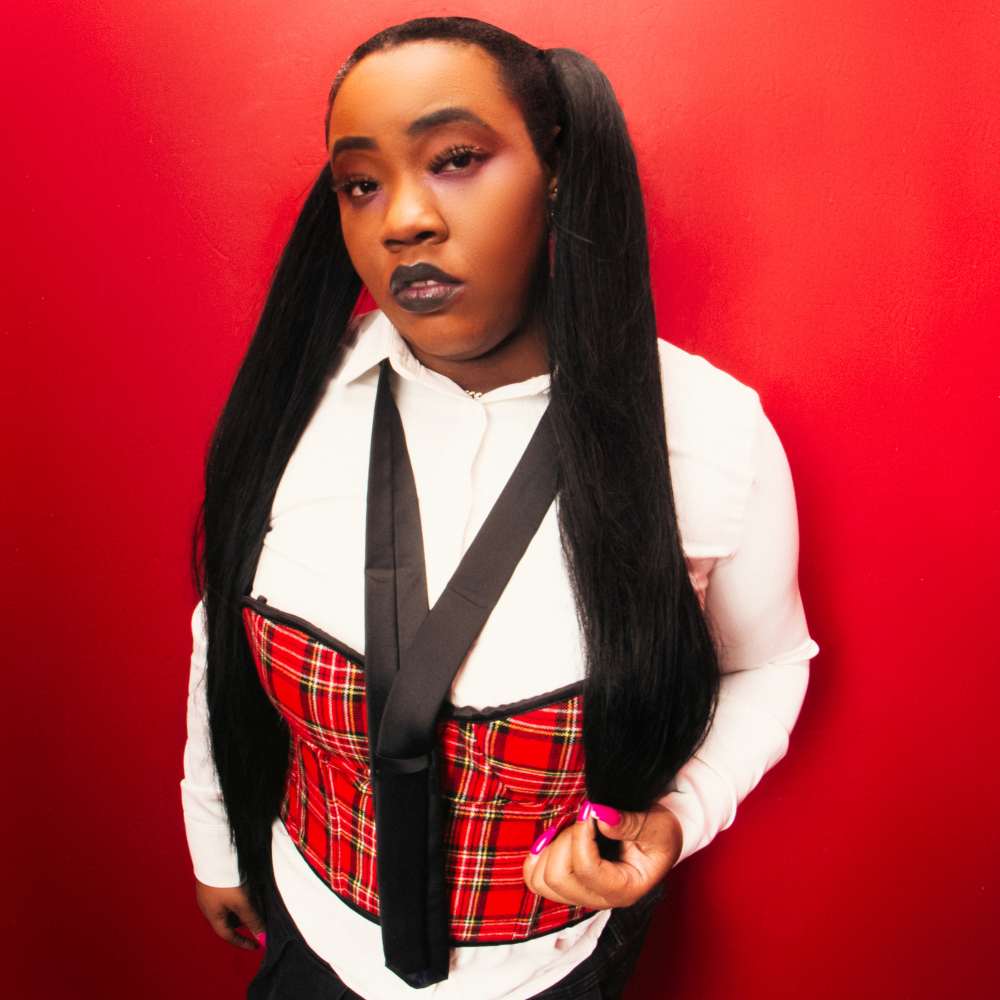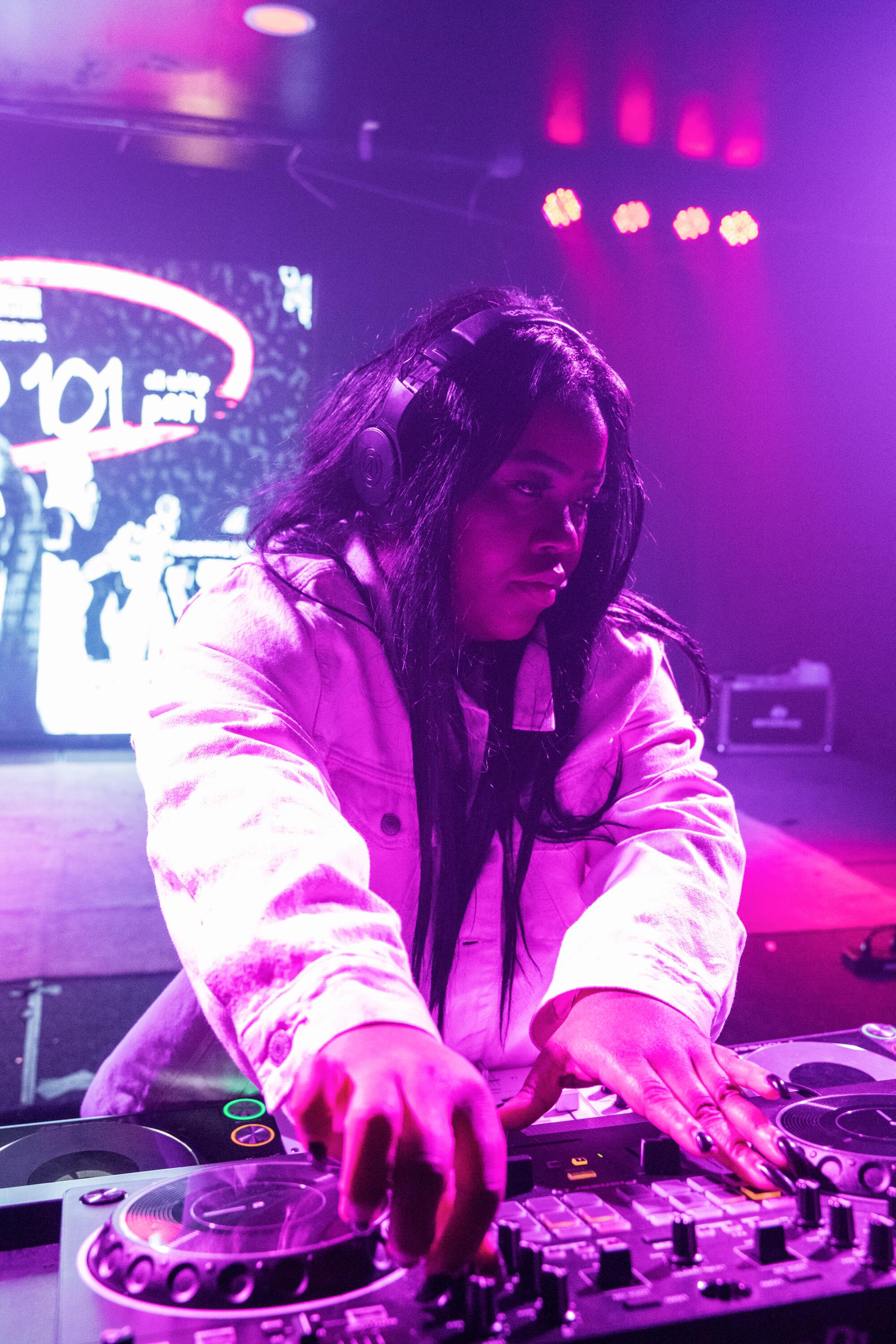
- Share via
Katelina Eccleston, better known as “La Gata,” first found her love for reggaeton on a quinceañera dance floor. As the lights dimmed and she began to move her body to the beat, she knew there was more to explore. Dedicating her life to the genre, the internet personality returns with a new and elevated season of the “Perreo 101” podcast.
Reggaeton Con La Gata, the platform founded by the 30-year-old-scholar, tells the genre’s history and cultural impact to an online audience. In 2017, Eccleston began sharing her analysis and understanding of the popular music with roots in Puerto Rico through Twitter threads. As her following grew, she started the “Perreo 101” podcast in 2018 and began lecturing about the subject at colleges across the country.
In the beginning, “Perreo 101” was audio-focused. Eccleston compiled research into explainer episodes that included a few interviews. The idea came from turning her viral posts, like the history of reggaeton, into audio retellings. Over the last six years, the series remained sporadic and informal.
For the record:
3:17 p.m. Aug. 14, 2024An earlier version of this article erroneously stated that La Sista will be a guest on a new season of “Perreo 101.”
With the new season, which debuted in July, Eccleston gives the bilingual podcast a revamp. She has a new set with audio and video capabilities, but her teachings in ethnomusicology and reggaeton remain the same. Guests include reggaeton singer Deevani and Puerto Rican rapper Villano Antillano — the space welcomes differing perspectives about Latin music. The project also includes an accompanying album co-created with Dominican producers and musicians Pamela Velez, Big Chriss Y Draco, Randy Class and Jaby Vibes.
This interview has been lightly edited for clarity and length.

Reggaeton Con La Gata is focused on the untold histories and misconceptions of the genre. When did you start thinking about the musical style with more of a critical level?
In my undergrad years — I say it without shame — I survived an assault. I was pissed. I knew I needed to put this anger somewhere. I needed to figure out what makes me happy. I turned to music in a way that I hadn’t prior and I just found it to be so healing.
I changed my career and I pursued a communications bachelor’s at Marymount Manhattan College where I was adamantly looking for ways to always put reggaeton into the mix of my work. I discovered the work of Dr. Marisol LeBrón [author of “Policing Life and Death: Race, Violence, and Resistance in Puerto Rico”], Wayne Marshall and Raquel Rivera [contributing authors of “Reggaeton”]. I realized people had already thought about this. It inspired me to really look at reggaeton in the context of the world, not just of, you know, my experience, but politics and things of that nature.
You started the music-focused platform in college. How did the podcast come about?
I actually didn’t even know what a podcast was when I created “Perreo 101.” A fan of mine suggested the idea. They told me to stop tweeting my ideas and instead I should record them and upload them as a podcast.
The first episodes were mirroring conversations I had on Twitter. At that point, I’d gone viral, a couple times. I was at the forefront of the conversation of what reggaeton is and what it’s not, as well as the war that has since died down between Panamanians and Puerto Ricans. My podcast helped facilitate that conversation.
“Perreo 101” started in 2018. Looking back at those first episodes, what has changed over the years?
It’s a new era. Before, it was so sporadic and I was really just vibing with the culture. I didn’t understand anything. Every week on Twitter, there was an argument, and I’m like, “Oh, I’ll show them.” I would make an episode and put songs to pair with the things that were occurring to me. I was just some girl who loved this genre and trying to emphasize that this genre is intelligent and deserves respect.
The episodes were released both in English and Spanish. How important was this?
It was a very conscious decision because I’m blessed to be bilingual. I grew up in Boston and I’m still in Boston. It’s pretty much like a little DR [Dominican Republic.] There are more Dominicans in Boston than any other immigrant group. My Spanish is Dominicanized as hell.
I recognize that this is an international conversation. I want people from Colombia, Argentina, Chile, Spain and France to participate. I don’t want it to ever be an excuse that they don’t understand me. I wanted to make sure that even artists get to chime in because they understand me, and I’ll translate if necessary. I wanted it to be transnational.
There are more podcasts now. Within the context of today’s audio landscape, what does this revival mean?
I say this all the time, everyone doesn’t need to have a microphone. I don’t say that as a hater, but having an audience is a responsibility. When you open your mouth, people are listening.
I came out at the same time Radio Menea by Verónica Bayetti Flores and Miriam Zoila Pérez, Locatora by Mala Muñoz and Diosa Femme. It was beautiful because we were a community and had respect for each other’s IP, each other’s culture, each other’s ideas. We learned from each other. We boosted each other. We came up together. It’s definitely different now.
The trajectory of “Perreo 101” had a sort of nontraditional, coming together. It has been lectured and assigned in classrooms for six semesters straight. The sound design may have been messy in regards to industry standards, but now people are resonating with what I’m saying and also with the style of storytelling. I wanted to tell the story exactly how I speak. That’s how I want you to hear me. I’m not putting on a different voice.
How does this new season of “Perreo 101” add to Reggaeton Con La Gata?
It’s a reiteration of what’s already been said, so a lot of stuff that will sound familiar. It’s an emphasis on things that I have since learned. In one of the first episodes, “Evolution of Roots,” I remember saying, “There’s no reggaeton without reggae.” Five years later, I would disagree with that, I would say, without dancehall.
What’s beautiful about this new season too is having guests. I’m not just educating the public with what I have to say. I’m getting lessons left and right from all guests.
It’s extremely humbling, but I think it is the most beautiful part of the pod now. It’s elevated stories compared to what was before. I was part ranting, part giving my perspective in musicology, part giving my perspective in regards to culture, and analyzing in the midst of it.
How did you build a following that trusts you?
Honestly, it’s been from transparency. I think everybody appreciates how I speak. I’m not putting on a corporate voice to try and appeal to a certain crowd.
I’m me everywhere. I have sworn at Harvard. It’s gonna happen. If you know me and you love me, it’s what’s gonna happen and you’re gonna deal with it. I just want my credit, and I just want my respect.
I think what everyone has been able to witness, with my platform, the grace that I allow others. I’m not the only person in this conversation nor am I trying to be. I don’t believe in cancel culture. I’m gonna critique Bad Bunny, and I’m still dancing to “Safaera.” Being consistent with that duality has allowed people to give pause. We all need more pause because we’re all angry and the anger is valid.
This podcast revival comes with an original album, also named “Perreo 101,” to pair with each episode. How does this change the listening experience?
As I was thinking about revamping “Perreo 101,” I’m saying what has been said already and adding new voices, which is even better. But, I’m such a nerd for the actual sounds of reggaeton and I realized I would love people to join me in listening to what these instruments are without the distraction of lyricism. I want you to just hear how beautiful it is and how danceable it is. I want people to hear Cubaton, rumba, salsa and Dem Bow underneath.
I don’t want lyrics. I want to hear the instruments because this is how I listen to reggaeton. Do we wanna get deep? Do we wanna zone out? Do we wanna tap in? It’s for whatever function we assign it. For me, a lot of times when I listen to reggaeton, the lyrics are great, but sometimes I zone out. I’m not even listening to what’s being said. I’m so enchanted by the beat.
What would you say is the optimal way to listen to the podcast and album?
I would listen to the song, then the podcast, and the song again, and just see if that would change your perspective in regards to the arrangement. I want to invite people to think about what they would add to it. I want them to think about what is there and how they would approach it differently, in addition to thinking about it critically.
More to Read
The Latinx experience chronicled
Get the Latinx Files newsletter for stories that capture the multitudes within our communities.
You may occasionally receive promotional content from the Los Angeles Times.







